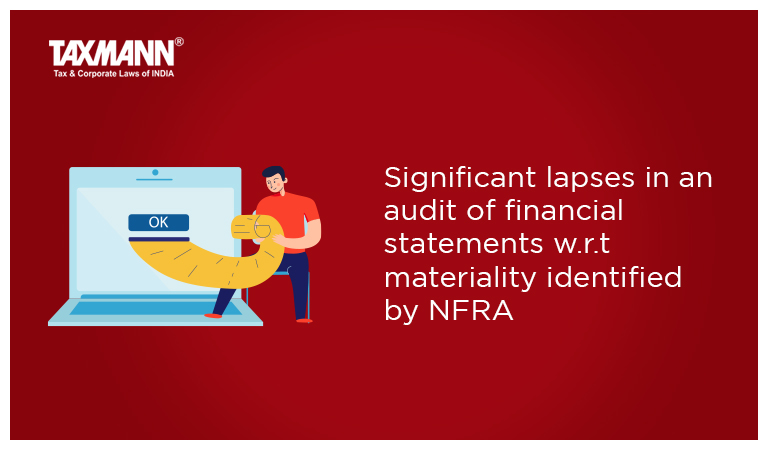Significant lapses in an audit of financial statements w.r.t materiality identified by NFRA
- Blog|News|Account & Audit|
- 2 Min Read
- By Taxmann
- |
- Last Updated on 20 July, 2022

As we know materiality is the most important concept in the audit of financials, as the fundamental concept of “true and fair” revolves around financial information being materially correct. Where any information in the financial statements is omitted or misstated and such information is material, those financial cannot give a true and fair view. Further para 5 of SA 320 states that while conducting audit of financials the concept of materiality applied by the auditor both in planning and performing the audit, and in evaluating the effect of identified misstatements on the audit and of uncorrected misstatements, if any, on the financial statements and in forming the opinion in the auditor’s report.
But, following are the instances of lapses that were found by NFRA, while examining the audit documentation of the auditor:
-
- Factors considered while determining the performance materiality as per the requirements of SA 320, were not documented.
- Failure to comply with the requirements of Para 10 of SA 320 i.e. where the lower materiality level would be applicable, then in that case auditor have to identify classes of transactions, account balances or disclosures.
- Failure to review the materiality working papers per the requirements of SA 220.
- Failure to understand the mandatory nature of each requirement/para of the SA
- Failure of engagement partner to document his review of the materiality
- No evidence to prove that the adequate audit procedures were followed to comply with the requirements of SA 320
- Casual documentation practices followed by the auditor which is in contravention of Para 8 read with Para A10 of SA 230 i.e. the auditor has to prepare audit documentation in a manner by which an experienced auditor can understand inter alia the nature, timing and extent of the audit procedures, their results, and significant matters arising during the audit
- WP does not document the name of the person who reviewed it along with the date of review
Click Here To Read The Full Story
Disclaimer: The content/information published on the website is only for general information of the user and shall not be construed as legal advice. While the Taxmann has exercised reasonable efforts to ensure the veracity of information/content published, Taxmann shall be under no liability in any manner whatsoever for incorrect information, if any.

Taxmann Publications has a dedicated in-house Research & Editorial Team. This team consists of a team of Chartered Accountants, Company Secretaries, and Lawyers. This team works under the guidance and supervision of editor-in-chief Mr Rakesh Bhargava.
The Research and Editorial Team is responsible for developing reliable and accurate content for the readers. The team follows the six-sigma approach to achieve the benchmark of zero error in its publications and research platforms. The team ensures that the following publication guidelines are thoroughly followed while developing the content:
- The statutory material is obtained only from the authorized and reliable sources
- All the latest developments in the judicial and legislative fields are covered
- Prepare the analytical write-ups on current, controversial, and important issues to help the readers to understand the concept and its implications
- Every content published by Taxmann is complete, accurate and lucid
- All evidence-based statements are supported with proper reference to Section, Circular No., Notification No. or citations
- The golden rules of grammar, style and consistency are thoroughly followed
- Font and size that’s easy to read and remain consistent across all imprint and digital publications are applied



 CA | CS | CMA
CA | CS | CMA
